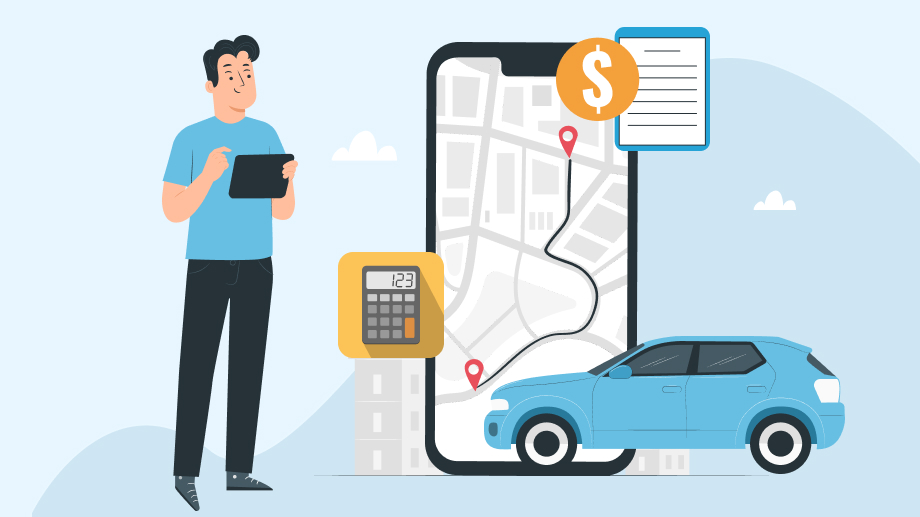In field service industries, travel is an essential part of the job. Whether technicians are driving between job sites or using personal vehicles for work-related tasks, transportation costs can add up quickly. From fuel and tolls to maintenance and depreciation, these expenses need to be accounted for under business mileage reimbursement.
While many businesses recognize the need to reimburse employees for work-related mileage, there is no federal law mandating it. However, several states do have legal requirements that employers must follow. Understanding these rules is crucial to staying compliant, ensuring fair compensation for employees, and avoiding potential legal issues.

So, which states require business mileage reimbursement? As of 2025, only three states have laws in place requiring employers to reimburse employees for mileage: California, Illinois, and Massachusetts.
States Requiring Business Mileage Reimbursements in 2025
California
California Labor Code Section 2802 requires employers to reimburse employees for necessary work expenses, including personal vehicle use.
Employees must receive compensation for fuel, maintenance, and wear and tear when using their own cars for business travel. However, employers do not cover daily commuting since it is a personal expense.
While California does not mandate a fixed reimbursement rate, many employers follow the IRS standard mileage rate, which is 70 cents per mile in 2025 (up from 67 cents in 2024).
Illinois
Illinois is one of the few states that legally require business mileage reimbursement for employees who use their personal vehicles for work. Under the Illinois Wage Payment and Collection Act (820 ILCS 115/9.5), employers must compensate workers for all necessary expenditures or losses incurred while performing job-related duties. This includes mileage reimbursement for business-related travel.
Employers are not responsible for normal wear and tear, employee negligence, or theft, unless the theft occurs due to the employer’s negligence. Additionally, employees must follow company reimbursement policies to be eligible for compensation.
Like in California, the law does not specify a fixed rate for mileage reimbursement in 2025. However, most businesses follow the IRS standard mileage rate, which is 70 cents per mile in 2025. Employers must pay a higher amount if necessary to fully reimburse employees for their business mileage expenses.
Massachusetts
Massachusetts is one of the few states that legally requires business mileage reimbursement. Under Massachusetts regulation 454 CMR 27.04(4)(b), employers must compensate employees for all transportation expenses incurred during work-related travel.
The law states: “An employee required or directed to travel from one place to another after the beginning of or before the close of the workday shall be compensated for all travel time and shall be reimbursed for all transportation expenses.”
This means that workers who travel between job sites or visit clients using their personal vehicles must be reimbursed for mileage and other associated costs. However, daily commuting from home to work is not reimbursable, as it is considered a personal expense.
Even Massachusetts does not set a fixed reimbursement rate. But employers often use the IRS mileage reimbursement rate, which is 70 cents per mile for 2025.
How to Calculate Mileage Reimbursement
Employers in California, Illinois, and Massachusetts must provide business mileage reimbursement for employees who use personal vehicles for work-related travel. While there is no federal reimbursement for mileage mandated by law, businesses often follow the IRS mileage reimbursement rate, which is 70 cents per mile in 2025.
Understanding how to calculate mileage reimbursement is essential to ensure fair compensation while remaining compliant with state labor laws. Here are the four primary methods used for mileage reimbursement in 2025:
- Cents-Per-Mile (CPM) Reimbursement
- Employees log work-related miles and receive compensation based on the IRS mileage rate.
- This method is widely used because it is straightforward and ensures compliance with business mileage reimbursement laws.
- Employees log work-related miles and receive compensation based on the IRS mileage rate.
- Actual Expense Method
- Employees submit receipts for fuel, maintenance, insurance, and depreciation, and employers reimburse the exact costs incurred.
- While highly accurate, this method requires employees to maintain detailed records. If receipts are unavailable, a signed statement explaining the missing documentation may be required.
- Employees submit receipts for fuel, maintenance, insurance, and depreciation, and employers reimburse the exact costs incurred.
- Lump-Sum Payments (Car Allowance)
- Employers provide a fixed monthly payment to cover business mileage reimbursement costs.
- While convenient, this method must ensure fair compensation to meet mileage reimbursement 2025 standards.
- Employers provide a fixed monthly payment to cover business mileage reimbursement costs.
- Fixed and Variable Rate (FAVR) Reimbursement
- Separates fixed costs (insurance, registration, depreciation) from variable costs (fuel, maintenance, repairs).
- This method provides the most accurate reimbursement but involves complex calculations and detailed tracking.
- Separates fixed costs (insurance, registration, depreciation) from variable costs (fuel, maintenance, repairs).
Why Mileage Tracking with allGeo is Essential for Field Businesses
Automatic Mileage Tracking – Employees don’t need to manually log miles, reducing administrative burden and errors.
Smart Route Optimization – Reduces unnecessary travel and helps businesses lower fuel costs.
Customizable Reporting & Payroll Integration – Automates mileage expense calculations and ensures timely reimbursements.
Real-Time Employee Tracking – Helps field businesses verify employee locations through GPS and track accurate travel details for business-related mileage.
Conclusion
Understanding how to calculate mileage reimbursement is essential to staying compliant. Leveraging an automated mileage tracking system like allGeo can significantly simplify compliance and expense management. With real-time GPS tracking, automated mileage logs, and seamless payroll integrations, businesses can:
- Ensure accurate and transparent mileage tracking
- Automate expense reporting and payroll processing
- Optimize field service routes to reduce unnecessary travel
- Maintain compliance with California, Illinois, and Massachusetts reimbursement laws
By integrating allGeo’s mileage tracking capabilities, businesses can streamline mileage reimbursement in 2025, reduce administrative workload, and provide employees with fair and timely compensation for work-related travel.


